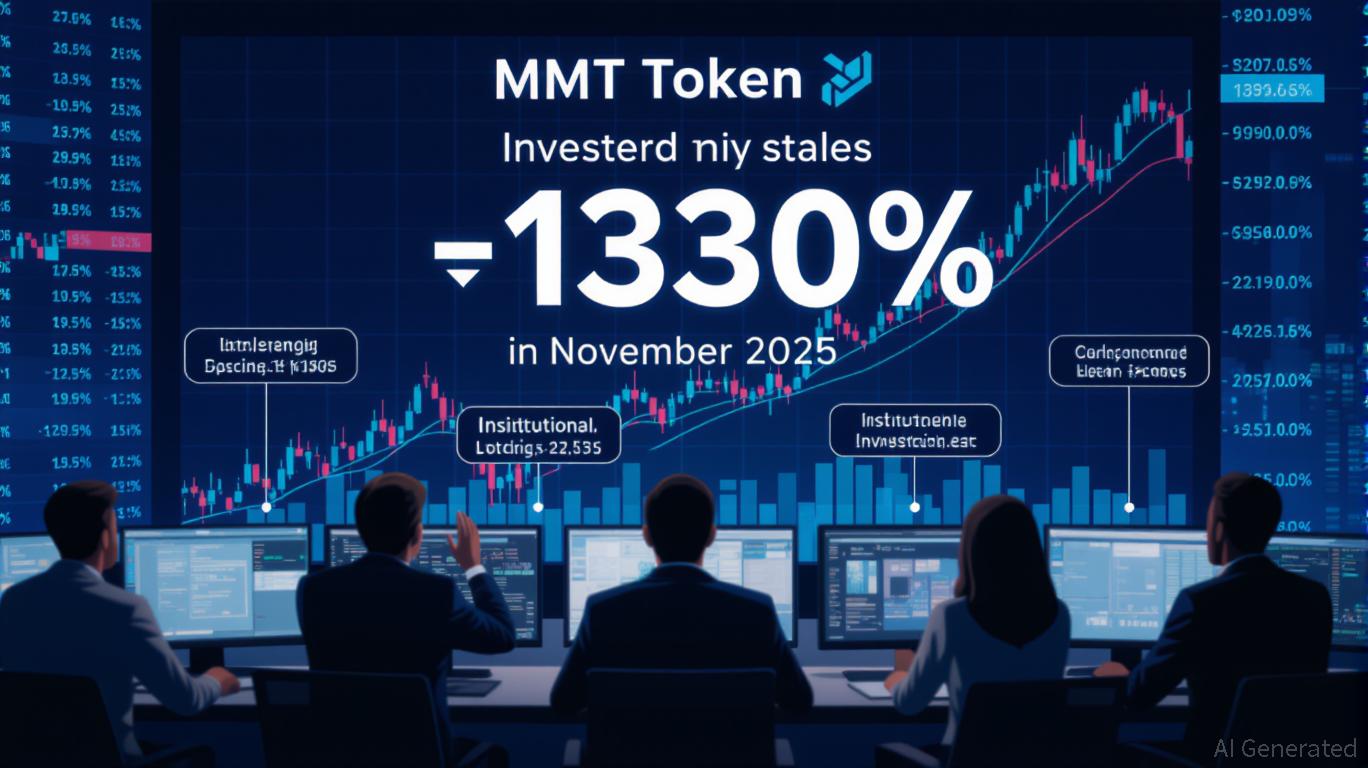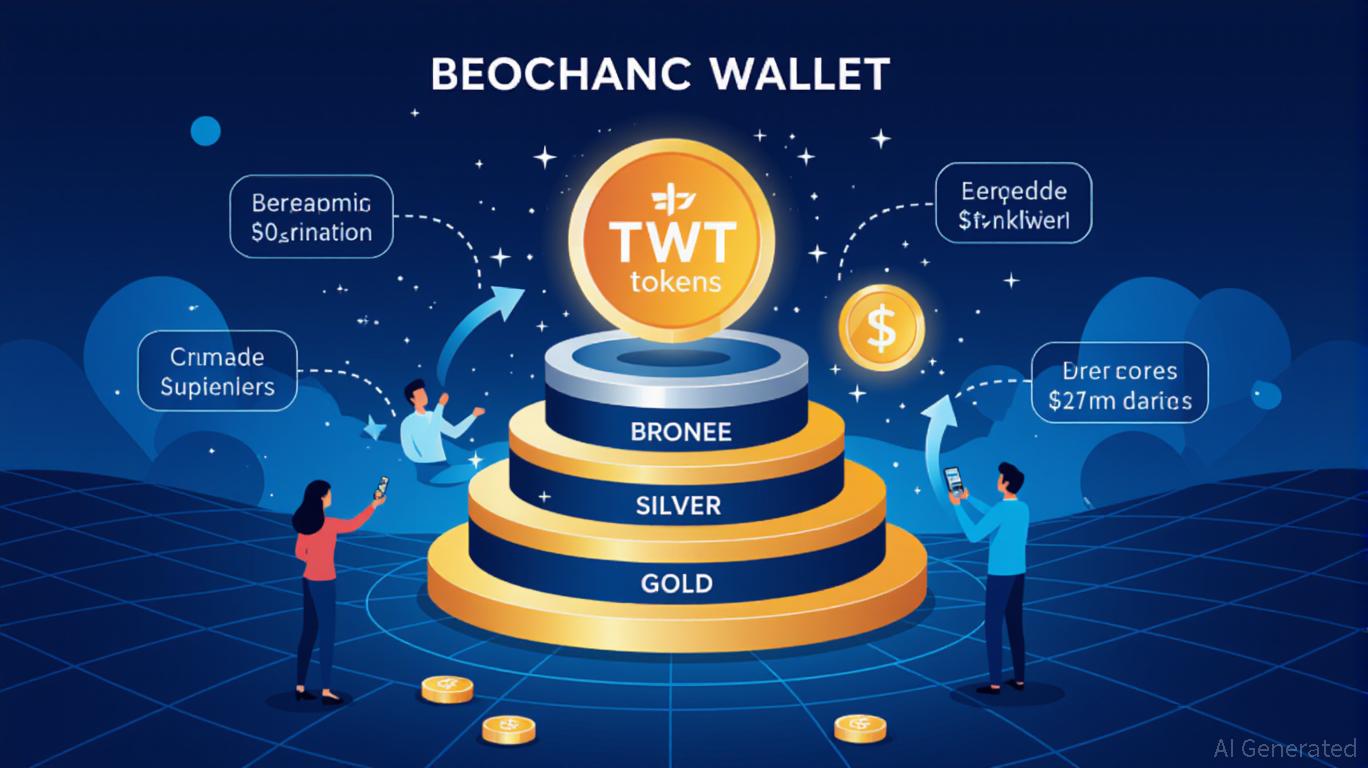News
Stay up to date on the latest crypto trends with our expert, in-depth coverage.



- MMT token surged over 1300% on Binance in November 2025, driven by exchange listings and a 0.75% airdrop to BNB holders. - Institutional investors like 1607 Capital Partners increased MFS Multimarket Income Trust stakes by 84.7%, signaling yield-focused confidence. - Binance's margin trading and futures contracts, plus Upbit/Bithumb listings, amplified liquidity but exposed MMT to volatile market sentiment. - Absence of influencer endorsements highlights structural factors (airdrops, institutional alignm

- Trust Wallet's Onramper partnership expands fiat-to-crypto access via 130+ local payment methods in 190+ countries, aligning with post-DeFi utility-driven adoption. - The collaboration boosts TWT demand through 210M+ users funding wallets via UPI/VietQR/M-Pesa, enhancing token utility for governance and fee discounts. - Elliptic's $100M institutional backing highlights growing blockchain data infrastructure importance, indirectly validating Trust Wallet's compliance-focused onboarding strategy. - TWT's v

- Trust Wallet's TWT tokenomics shift to utility-driven incentives via Trust Premium, replacing speculative governance with tiered rewards for user engagement. - FlexGas and RWA partnerships expand TWT's utility as a fee currency and bridge between DeFi and traditional finance, enhancing demand and scarcity. - Tiered rewards and token locking create flywheel effects, stabilizing supply while incentivizing long-term participation over short-term liquidity. - Challenges include Binance's collateral ratio cut

Ethereum investors are easing selling pressure, hinting at cautious optimism. However, with RSI still below neutral, ETH may consolidate between $3,489 and $3,287 until bullish momentum returns.

- Institutional investors are increasingly allocating to digital assets, with Astar 2.0 emerging as a key platform due to its scalability and interoperability. - Astar 2.0’s hybrid architecture and partnerships with global enterprises like Casio and Sony enhance its institutional appeal through real-world applications. - The platform’s on-chain governance and enterprise-grade security align with institutional priorities, despite challenges in transparent communication and competition.

- Aster DEX's 2025 governance changes redefined ASTER as a functional trading collateral and fee discount asset, boosting liquidity provider (LP) engagement. - The 80% margin ratio and 5% fee discount incentivized LPs to reallocate capital, adjust staking behaviors, and adopt novel yield strategies like "Trade & Earn." - ASTER's price surged 860% post-TGE, TVL grew from $172M to $2.18B, and Coinbase's roadmap inclusion signaled institutional validation of the platform's privacy-focused DeFi model. - Upcomi

- ZK Technologies surged in Nov 2025 due to breakthroughs in zero-knowledge (ZK) scaling solutions and institutional adoption. - Ethereum's EVM optimization reduced ZK-proof costs 50x, enabling 24,192 TPS on layer 2 protocols like Lighter. - Deutsche Bank and Sony adopted ZK-rollups for scalable compliance, while StarkNet's TVL tripled via $72M bridged BTC. - Institutional capital prioritizes ZK infrastructure for security and scalability, though regulatory risks and margin pressures persist.

- DASH cryptocurrency surged 150% in June 2025 via tech upgrades and pro-crypto policies, defying market caution. - DoorDash stock (-17.83% in one day) and Dash crypto must be distinguished despite shared ticker symbol, per Bitget/OKX. - Institutional adoption (Aster listing, 120% open interest rise) and retail hype around privacy features drove DASH to 3-year highs. - Regulatory scrutiny of privacy coins and competition from Monero/Zcash pose risks to Dash's market position, OKX warns. - DASH's rally refl
- 10:37The SEC is expected to "approve a batch" of altcoin ETFs after the government shutdown ends.Swiss crypto banking group Sygnum stated that despite the pullback in October, "strong demand catalysts" and institutional participation remain at historic highs, and the increasing number of ETF applications signals more institutional demand. Currently, at least 16 crypto ETF applications are pending approval, with these approvals delayed due to the 40-day-long U.S. government shutdown. Crypto staking ETFs may become the next fundamental catalyst to stimulate institutional demand for cryptocurrencies. Over 80% of surveyed institutions expressed interest in crypto ETFs beyond Bitcoin and Ethereum, and 70% of institutions clearly stated that if these ETFs offer staking yields, they would begin investing or increase their allocations. Staking refers to locking tokens in a proof-of-stake blockchain network to maintain network security and thereby earn passive income. Sygnum believes that investors are waiting for the government shutdown to end, which could prompt the U.S. SEC to "approve batches" of altcoin ETFs, thereby catalyzing "a new wave of institutional capital inflows."
- 10:37Data: Most x402 ecosystem tokens on the Base chain saw a general decline today, with PAY AI, PING, and others dropping by more than 20%.ChainCatcher News, according to GMGN monitoring, possibly due to the news that "the Uniswap fee switch may cause fraudulent pools on Base to disappear," trading volume on the Base chain has declined in the past 24 hours, and tokens related to the x402 ecosystem have seen varying degrees of correction today, including: VIRTUAL: down 11.6% in 24 hours, with a current market cap of $674 million and a current price of approximately $1.35; PING: down 23% in 24 hours, with a current market cap of $25.3 million and a current price of approximately $0.025; PAY AI: down 20% in 24 hours, with a current market cap of $15.4 million and a current price of approximately $0.015; dreams: down 20% in 24 hours, with a current market cap of $22.2 million and a current price of approximately $0.022; ChainCatcher reminds investors that volatility in the cryptocurrency market has increased significantly recently, and investors should pay attention to risk management.
- 10:20North Korean hacker group KONNI uses Google Find Hub feature for the first time to remotely wipe data from Android devicesChainCatcher reported that security researchers have discovered a new attack method developed by the North Korean hacker group KONNI, which for the first time uses Google's Find Hub asset tracking feature to carry out remote data wipe attacks on Android devices. The attackers disguised themselves as psychological counselors and human rights activists, distributing malware called "Stress Relief Program" via the KakaoTalk communication platform in South Korea. Once victims execute these files, the attackers steal Google account credentials, use the Find Hub feature to track device locations, and perform remote resets, resulting in the deletion of personal data. This attack has been confirmed as a follow-up action of the KONNI APT campaign, which is closely linked to the North Korean government-backed Kimsuky and APT 37 groups. Security experts recommend that users strengthen account security, enable two-factor authentication, and remain vigilant about files received through instant messaging tools.